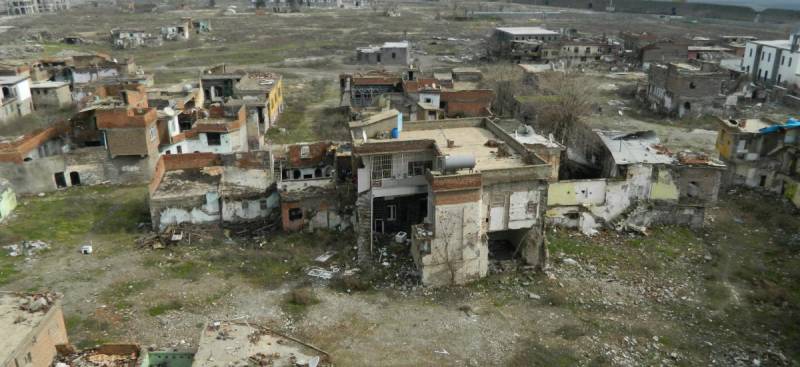“He had no head, only a part of his jaw and a few hairs from his beard were left. I recognised him from those hairs. I looked for his teeth, I knew him from the thick ones. He had no skull…”
“They gouged out Yasemin’s eyes. That’s what I think of the most. Did they gouge out my daughter’s eyes while she was still alive?”
“Three years have passed, and there still isn’t even a hair from my daughter’s head. She was a high school student, and they burned her. In all likelihood they threw her remains in the river. I wish I still had a strand of her hair.”
“Mehmet was 10 years old. The day he was killed was his birthday, he was asleep in his bed. I want the world to know, my little son was murdered in his bed. Can a 10-year-old child be a terrorist? I want the whole world to know of Mehmet’s mother’s cause.”
“Seyda’s corpse stayed in the kitchen where he was killed. My husband couldn’t go into the kitchen to take his corpse for a fortnight. Imagine what it means for a body to stay on the floor those 14 days. Imagine your loved one’s dead body is in the kitchen and you can’t go in there to take it from the floor.”
Is each of these scenarios not unthinkable?
In the 21st century, human rights are explained at great length in books, laws, constitutions and international agreements. But none of these treaties or these laws protected the right of Sait, Yasemin, Hacer, Mehmet or Seyda to live.
None of these laws prevented 15-year-old Yasemin’s eyes from being gouged out, 19-year-old Hacer from being burned alive, 71-year-old Seyda’s body from lying for a fortnight on the floor, or little Mehmet from being shot dead in his bed.
Between 2015 and 2016, the Turkish military’s operations in cities of Kurdistan saw not only human rights, but all the beliefs, religions and laws drawn up since the dawn of humanity trampled on. And all of these terrible human rights violations were justified by a single word: terror.
Can a state gouge out a person’s eyes? Can it burn someone alive? Can it leave one’s corpse lying outside for months to be eaten by carrion? Human rights have been consigned to the dustbin in my country in the 21st century.
As a defender of human rights, I have lived my life with a heartfelt belief in the goodness, happiness and completeness of people, in the universality of human rights, but most of all in our shared humanity. It was with these heartfelt beliefs that I rushed to Lalish and Mosul in Iraq and to help Yazidi women after they were attacked by Islamic State. I went to villages that had lain in ruins for decades and helped villagers rebuild their lives.
The belief in our shared humanity extends far past my own Kurdish people; I do not feel responsible only for Kurds, but for Yazidis, Romanis, Jews, Armenians, and all others. I thought that everyone in this world had a shared responsibility for others.
But what I saw in the Turkish military operations in Kurdish cities in 2015 and 2016 showed me that no, apparently we are not. Only some of us, apparently, count fully as people. It seems that the concept of universal human rights that we had proclaimed every day of our lives was a great lie.
Human rights apparently is not more important than daily politics and ideological polarisation. The statement that human rights are for all does not include the people burned to death in a basement in Cizre, nor 10-year-old Mehmet who was killed in his bed in Silopi.
I am reminded of all the talks I gave over the decades when I said human rights were not for the West or the East, but for everyone. Apparently I was mistaken – human rights are reserved only for some.
Even if some people took up arms against the state, could people sheltering in a basement in Berlin be burned alive? Think of a dead body left lying on the ground in the middle of New York’s 42nd Avenue. Think of a mother in Paris whose daughter has died, but she is not allowed to bury her. So, she keeps her daughter in the fridge to stop the corpse from rotting. Think of whole sections of London levelled with its inhabitants trapped under the rubble. Imagine authorities demolishing Prague, saying they had to because of 100 armed youths, like they did to Sur, my 7,000-year old UNESCO-protected district of the city of Diyarbakır.
The struggle for human rights has achieved some very important successes. It has led to the establishment of valuable organisations and foundations active around the world. It has formed international bonds of solidarity. And most of us are still on our feet thanks to this solidarity.
But it is by no means perfect. I object to a struggle that does not look at people, that forms its discourse according to the perpetrator of infractions, that fails to give voice to those who are voiceless and that turns everything into a matter of numbers.
Homes have been destroyed, children have died. Each death is far more than a number. It is time to distance human rights from these figures. The time has come to transform the struggle for human rights and bring it back to its proper place.
